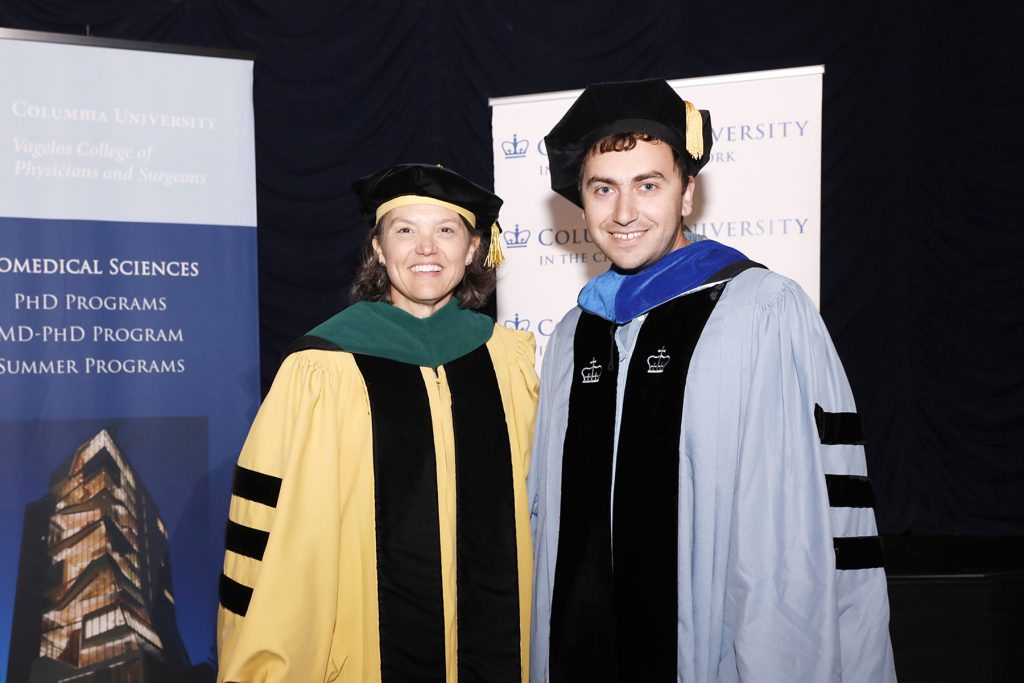PhD Profile: Jonah Einson —
Improving Drug Discovery Through Bioinformatics
Drug development is a billion dollar industry with a low success rate, even with a dramatic increase of life-enhancing — or even life-saving — drugs that have been produced by the pharmaceutical industry over the last several decades. The approval process is both expensive and time consuming, and one recent DBMI PhD graduate is looking at ways to improve the process through genetic support.
Jonah Einson, PhD, focused his research on the bioinformatics side of biomedical informatics. He was interested in DNA and RNA, and in using computational techniques to integrate those two through state-of-the-art technologies.
“A focus of my research was on studying incomplete penetrance, which

Jonah Einson, PhD, stands with CUIMC CEO and Dean Katrina Armstrong, MD (photo by Michael DiVito)
is a situation where somebody can have a genetic variant that is known to cause disease, but experiences mild or no symptoms of that disease,” said Einson, a member of the Tuuli Lappalainen Lab. “Much of my work in the Lappalainen Lab was on integrating DNA and RNA sequencing data. For me, specifically, I used DNA sequencing to identify individualswithrare genetic mutations, and RNA sequencing to show that alternative splicingcould lead to reduced disease in these individuals, on a population wide scale.”
Einson co-led two studies currently in preprint throughout his time at DBMI (The impact of genetically controlled splicing on exon inclusion and protein structure and Genetic control of mRNA splicing as a potential mechanism for incomplete penetrance of rare coding variants), and his dissertation was titled “Common and rare genetic effects on the transcriptome and their contribution to human traits.” His abstract provides greater details on this work:
Bridging the gap between genetic variants and functional relevance is a principal goal of human genetics, but interpreting the biological mechanisms that link variants to phenotypes is a continuous challenge. This goal applies to rare and common variants, although the specific challenges vary depending on the variant’s frequency and effect on gene dosage or protein structure. Deciphering these variants’ modes of action is crucial for a more holistic understanding of genome regulation.
This dissertation will advance interpretation of rare and common variants across the annotation spectrum, by utilizing functional data derived from population scale RNA-sequencing studies. I aim to answer three main research questions: (1) How do rare variants affect gene expression, and can these subtle changes be robustly detected? (2) How do common variants that influence pre-mRNA splicing influence protein structure and human traits? (3) Can joint effects between common splice-regulatory and rare loss-of-function variants be detected through the lens of purifying selection? All aims build on knowledge acquired through large-scale transcriptomics and open access data. Ultimately, these three studies will contribute to our understanding of genome regulation, which will be crucial in a future of personalized medicine.
Einson spent much of his time in the New York Genome Center in Lower Manhattan, where he was able to work with peers both locally from NYU and Weill-Cornell, as well as with collaborators around the globe. Lappalainen, a well-known leader in the genomics field who relocated to Sweden in 2020, lauded the work of her final DBMI mentee.
“Jonah’s work spanned many of the most powerful data sets and tools in human genetics and genomics,” Lappalainen said. “From DNA variation analysis with TopMed data, RNA analysis with GTEx data, and integration with AlphaFold protein structure predictions, in his research he developed new ideas how these data can be integrated to learn about molecular mechanisms of diseases and traits.”
 The field of biomedical informatics includes a wide swath of specialties — including Einson’s focus of bioinformatics — but it also has a simple mission that he was taught on Day 1 of his Introduction to Informatics course.
The field of biomedical informatics includes a wide swath of specialties — including Einson’s focus of bioinformatics — but it also has a simple mission that he was taught on Day 1 of his Introduction to Informatics course.
“Physicians plus computers are better than just physicians,” he said. “Informatics is all about using computers to help interpret your field. Everybody comes here with some domain knowledge that they are interested in using computers to improve. For me, informatics is all about applying data science techniques to do something practical and useful in biology.”
Improving the approval process for drug clinical trials would certainly qualify as useful. Einson recently accepted a position as a Genetic Data Scientist with Genscience, a start-up company whose goal is to develop a platform that will help other pharmaceutical companies use genetics to hone in on new drug targets that have genetic support.
“Our company is trying to predict whether a drug is going to succeed or not before it enters a costly clinical trial,” Einson said. “A good way to do that is to utilize genetic evidence, which can indicate that the drug is targeting the disease mechanism itself and not just the disease symptoms. A lot of companies are on to this secret, but they aren’t doing a good job of using the data available to them. We’re trying to build a platform that can bring genetic evidence to the drug development in field in a meaningful and cost-effective way.”
This work relates to his DBMI research in both techniques and data sets, and the practical goal in mind is highly motivating for Einson. “Anything you can do to speed up or bring down the cost of clinical trials is going to be useful,” he said. “Whether it is designing better cohorts or doing better experimental designs so you can progress through the phases, any improvement would have impact.”
Progress is an important concept for Einson, who lauded the social justice work done within DBMI during his time at Columbia. While he wasn’t in NewYork-Presbyterian nearly as often as many of his peers, he felt a connection to the department and pride in its initiatives.
“Everybody does a good job keeping together and supporting each other,” Einson said. “I thought the DEI work they did during the pandemic was really impactful. Of the different departments that tried to do DEI work, I thought DBMI took it the most earnestly and kept with it, so I was really happy to see that. With the justice informatics group, I can tell the department is taking this important topic very seriously.
“It’s a great program, and I would highly recommend it to somebody interested in this field.”


